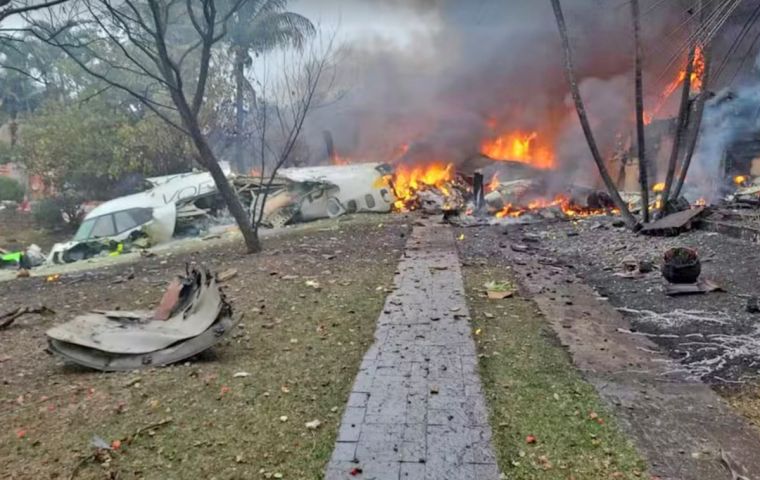MercoPress. South Atlantic News Agency
Problem with anti-icing system detected in Voepass crash probe
 There is no single factor for an accident, chief investigator Mendes Fróes explained
There is no single factor for an accident, chief investigator Mendes Fróes explained According to audio recordings preserved in the so-called “black box,” the co-pilot of the doomed Voepass flight 2283 spoke of “a lot of ice” before tragedy ensued, according to a preliminary report released Friday by Brazil's Center for Investigation and Prevention of Aeronautical Accidents (Cenipa), Agencia Brasil reported.
The Brazilian Air Force's (FAB) department highlighted that cockpit voice analysis pointed towards a failure in the de-icing system that protects the aircraft against the formation and accumulation of ice on the wings. It was also determined that the “airframe de-icing” system was switched on and off several times. However, it remains to be determined whether this was done manually by the crew or if it was a result of malfunctioning.
“There were two times on the voice recorders. In the first, the pilot comments that there was a fault in the airframe system. In a second moment, the co-pilot comments exactly this phrase: 'A lot of ice',” said Lieutenant Colonel Paulo Mendes Fróes, who heads the Investigation Commission,
According to Cenipa, during the period in which the flight took place, there was a lot of humidity combined with air temperatures below 0°C, which favored the occurrence of Severe Aircraft Ice Formation from north-central Paraná to São Paulo.
The crash occurred on August 9, in the municipality of Vinhedo (SP), and caused the death of the 62 people on board, including four crew members and 58 passengers.
The investigators reported that the aircraft was in a position to fly in icy conditions, with maintenance up to date; and that the pilot, co-pilot, and other crew members were qualified and experienced in this type of flight. At no time did the crew declare an emergency to the airspace control agencies or to nearby aircraft.
In addition, meteorological information was available before take-off and indicated severe icing on the route. “It is important to emphasize that there is no single factor for an accident, but several contributing factors. In the case of PS VPB [the Voepass aircraft], the loss of control of the aircraft occurred during the flight under conditions favorable to the formation of ice, but there was no declaration of emergency or report of adverse weather conditions,” Mendes Fróes explained.
Cenipa also stated that the plane that crashed was registered in the Regular Public Air Transport Registration Category (TPR), and was certified and equipped with systems that allowed it to operate in adverse environmental conditions, including icing ones.
According to Cenipa, the investigation will now follow three main lines of action: the human factor - which will assess the performance of the technical crew in the situation; the material factor - which will investigate the airworthiness condition, with special attention to the anti-icing, de-icing, and protection systems; and the operational factor - which will analyze the elements related to the operational environment that may have led to the accident.
“The information available in the Preliminary Report may be updated as new factual data is obtained. Our goal is to deliver the final report as quickly as possible, depending on the complexity of the incident and the need to uncover possible contributing factors,” Cenipa Chief Brigadier Marcelo Moreno noted.
The ATR 72 twin turboprop took off from Cascavel (PR) at 11.58 am for Guarulhos Airport. At 1.21 pm onwards, it stopped responding to calls from São Paulo Approach Control (APP-SP). It hit the ground in a residential area at 1.22 pm.
The Cenipa also noted that the investigation does “not seek to establish guilt or liability, as provided for in § 4, art. 1, of Decree No. 9,540/2018, nor is it set out to prove any probable cause of an accident, but indicate possible contributing factors that allow any technical issues related to the aeronautical occurrence to be elucidated.”




Top Comments
Disclaimer & comment rulesCommenting for this story is now closed.
If you have a Facebook account, become a fan and comment on our Facebook Page!